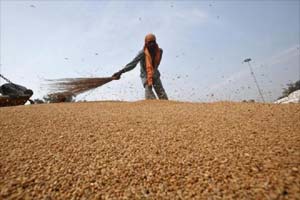Direct benefit transfer (DBT) can help the government save as much as Rs 25,000 crore, or 20%, in food subsidy expenditure in 2015-16 if two-thirds of the country’s population is targeted, as proposed in the national food security Act, according to a report by Crisil Research, reports fe Bureau in New Delhi.
The report assumes that if the extant public distribution system is bolstered as per the food security law, the food subsidy bill in 2015-16 would be R1,21,908 crore, factoring in a 3-4% increase in the benchmark prices of wheat and paddy, while the complete roll-out of DBT could reduce the subsidy level to R97,180 crore by eliminating costs associated with procuring, distributing and storing grains.
Terming it a “game changer”, the report said DBT would also stem pilferage in the PDS, better target the intended beneficiaries, offer them more choices to use the subsidy amount and boost discretionary spending.
Thus, DBT would fit into the concept of “Pareto improvement” — a development that hurts none and helps at least one person, and many over time, in the economy, it added.
Crisil also said the economic cost of grains sold through the PDS has been nearly twice the minimum support price (MSP) in the case of rice and almost 1.5 times the MSP for wheat, thanks to high incidentals of procurement.
Even after considering the conversion of paddy into rice, the economic costs would still be much higher than the paddy MSP. PDS leakages, too, have touched 46.7% at the all-India level, as showed by the Shanta Kumar-led panel, while a private study by Jean Dreze and Reetika Khera puts this number at 41.7%.
Importantly, with DBT, a poor family of five that is otherwise eligible to avail of food subsidy but doesn’t have access to the PDS due to various reasons, including absence of ration cards, could get as much as R5,800 in 2015-16, which is higher than the total annual expenditure (food and non-food) of the poorest 5% of rural households.



